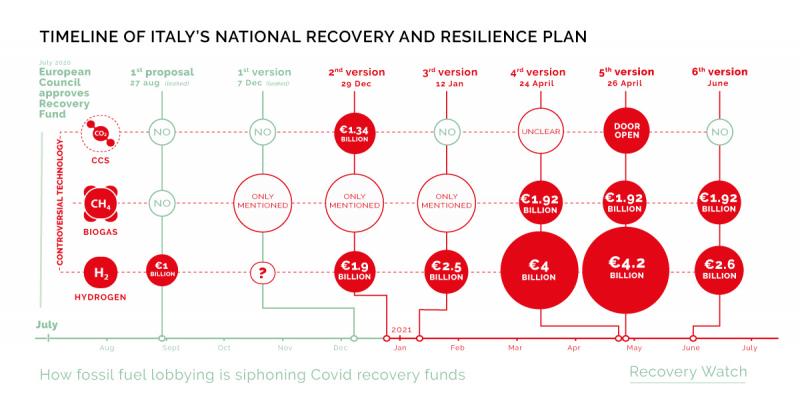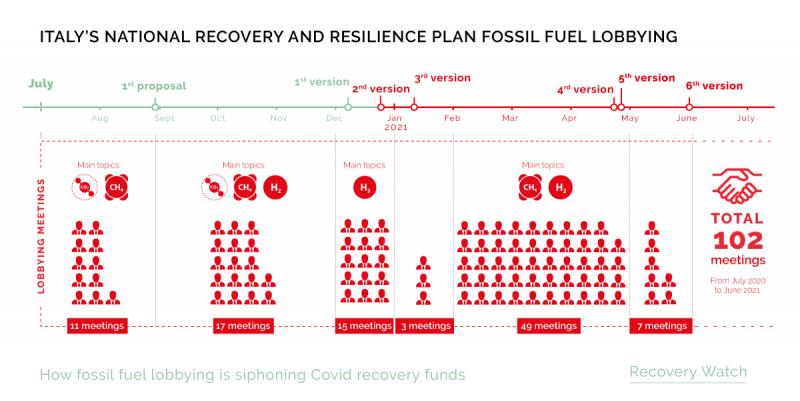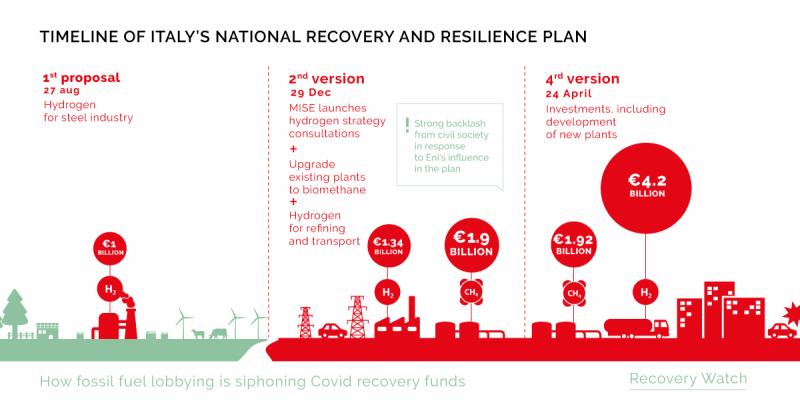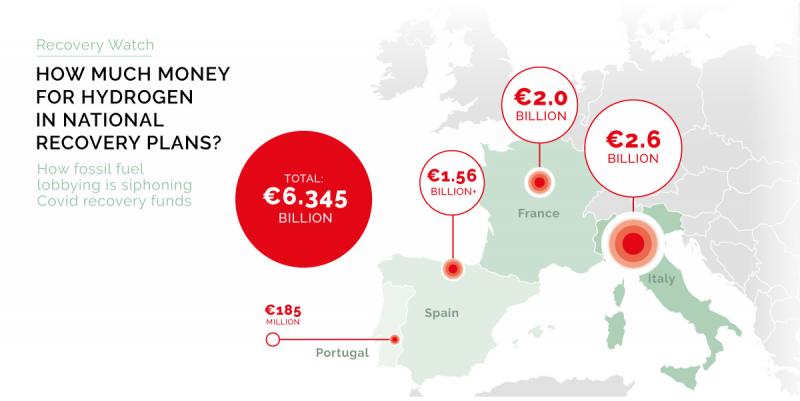
Hijacking the Recovery Through Hydrogen
How fossil fuel lobbying is siphoning Covid recovery funds
The European Commission said it wants to avoid giving billions in bailouts to the fossil fuel industry like it did in 2008 - but it’s doing just that: In Italy, France, Portugal and the Spanish State, €8.3 billion of EU recovery funds will be spent on hydrogen and renewable gases, thanks to fierce industry lobbying at national and EU level.
**Read the report in English, Spanish and French**
The outsized role for hydrogen and renewable gases is thanks to a concerted lobbying effort from the fossil fuel industry, who see it as a lifeline for their business models, as well as one of their main products: fossil gas.
The investigation - a collaboration between Fossil Free Politics and the European Network of Corporate Observatories (ENCO) - found the fossil fuel industry enjoyed a prolific number of lobby meetings with ministers and senior government officials, was involved in high-profile events with key decision makers and was even invited to draft - and now implement - national recovery plans.
Italy is spending more on hydrogen and renewable gases than much-needed intensive care units, while the Spanish government is spending 50% more on hydrogen and renewable gases than on its national health system.
Not only is the EU handing public money to an industry notorious for trying to block and delay climate action, but the over-emphasis on hydrogen could lock Europe into decades more of fossil fuels.
The report also marks the launch of the ENCO ‘Recovery Watch’ project, investigating how big business is influencing recovery plans at national and EU level and is seeking to capture the recovery funds for corporate interests.
In Italy:
- Spending on hydrogen in the recovery plan quadrupled between drafts thanks to fossil fuel lobbying for ‘blue’ fossil hydrogen with CCS, before the Commission pulled EU funding for fossil fuel projects. However the Italian government is expected to still fund them.
- The government is spending more than €4.5 billion of EU funds on hydrogen and biomethane but only €4 billion on improving ICUs and medical equipment.
- The Italian government had at least 100 meetings with the fossil fuels industry regarding the recovery funds, with Eni, Enel and Snam accounting for half of them.
- Eni has been lobbying for ‘blue’ fossil hydrogen to decarbonise transport, but in fact admitted it would use the fuel in its refineries, ie. to create petrol and diesel.
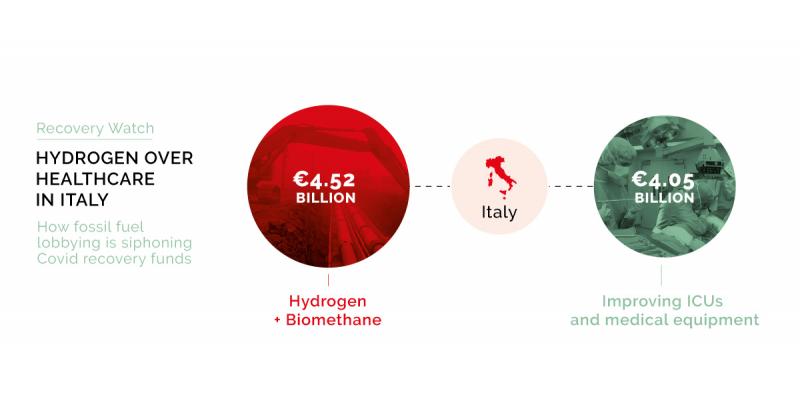
In the Spanish State:
- The Renewable Hydrogen Roadmap has €1.6 billion dedicated to it, 50% more than the budget for improving the national health system. But overall a pot of €17.8 billion could be available to hydrogen projects.
- The Big Four accountancy firms have been involved in drafting how the recovery funds will be spent at national level and will now be involved in implementing plans. As their clients include the same big energy companies applying for funds, this represents a glaring conflict of interest.
- Endesa, Naturgy and Iberdrola alone have proposed projects worth €53 billion, which if built would account for more than 70% of Spanish recovery funds.
- The drafting of the spending plan has excluded civil society but the result is strikingly similar to the draft proposed by the country’s main business lobby.
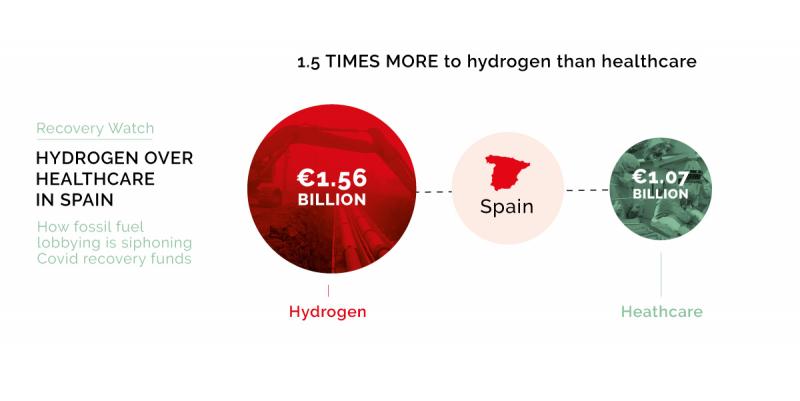
In Portugal:
- The implementation of the national recovery plan, which was drafted by an oil and gas executive, will now be overseen by that same executive.
- Only 18.4% of Portugal’s recovery plan is specifically targeted towards a ‘green transition’, despite the government and EU claiming a total of 38%.
- The high frequency of meetings between the country’s biggest fossil fuel firms and ministers raised enough suspicion to open a criminal investigation into one of the biggest proposed hydrogen projects.
In France
- According to the President of France Hydrogène, the main trade group coordinating hydrogen lobbying in France, “the key aspects” of its hydrogen-heavy recovery plan roadmap “were taken up by the French government”.
- Lobby spending by France Hydrogène has doubled year-on-year since 2017, reaching €200,000-€300,000 in 2020, while yearly registered lobby activities around hydrogen have increased five-fold from 9 in 2017 to 47 in 2020.
- France is not spending any of its EU recovery funds on additional renewable electricity to meet the demand from its ‘green’ hydrogen programme.
- The fossil fuels industry is playing a major role in France’s recovery plans and is strongly behind hydrogen, thanks to the government creating numerous public-private partnerships such as the all-industry National Hydrogen Council.
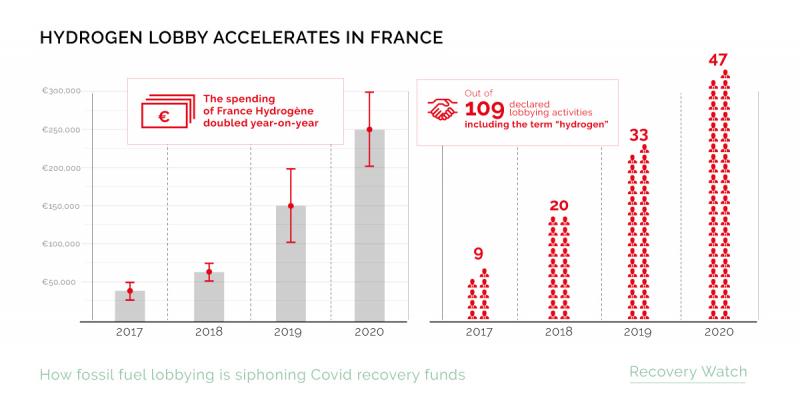
At the EU level:
- Fossil fuel lobby groups in Brussels are making extensive use of the revolving door, hiring staff previously with the European Commission, European Parliament and EU Permanent Representations.
- The industry has been pushing the Commission to adopt a ‘technology neutral’ approach to recovery fund spending so their pet projects, like CCS and ‘blue’ fossil hydrogen, can receive public money.
- Despite the Commission u-turn on allowing EU funds for Italian ‘blue’ fossil hydrogen with CCS, EU Commissioners for Climate and Energy have both publicly backed the technologies.
- Freedom of Information requests have revealed that high-level European Commission staff and the EU Recovery Task Force team have been regularly sharing platforms with the oil and gas industry, as well as encouraging their participation in the recovery funds.
As the report shows, industry has been aggressively lobbying at the national and EU level not just for ‘green’ hydrogen and biomethane but also for ‘blue’ hydrogen and CCS. And despite the Commission appearing to exclude them from EU recovery funds, there are still other European and domestic funds available to support these fossil fuel projects. Expect lobbying at the national level to intensify, with recovery funds being released by the EU from the second half of July.
The only path to a fossil-free recovery that prioritises social and environmental justice, rather than pouring more public funds into polluting corporations’ pockets, is to cut the fossil fuel industry out of public decision-making processes at the national, EU and international level, similar to existing restrictions on the tobacco industry.
